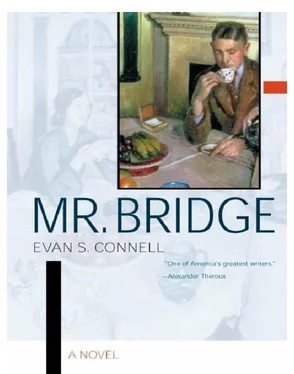He heard what he thought was the peck of a bird at the bathroom window, but then he knew it must be his wife tapping at the door. He sat up, realizing he had gone to sleep, and saw his dripping hands, which for an instant he could not recognize. They had been lying under the water for so long that they were shriveled and wrinkled.
“May I come in?” she asked.
“The door is unlocked,” he said.
She stepped into the bathroom. She looked tired and subdued. He asked how Virgil was feeling and she answered that Dr. Foster was there.
“Dr. Foster,” he said. “If you want my opinion, Virgil is more in need of a sedative than any spiritual consolation.”
She replied vaguely, “Oh? I suppose. I was on the phone most of the day. So many people called.”
“Was it a heart attack?”
“We’re afraid it was an overdose of pills. Lois and Madge have been there. We’re telling callers we don’t know the cause. We decided it wouldn’t do any good to disturb the men at work. That’s why I didn’t call you.”
“Sleeping pills,” Mr. Bridge said. “I suspected as much. Sleeping pills!” The idea of suicide exasperated him. Now her children must suffer, and she had hurt her husband in the cruelest way a woman can hurt a man. Rather than go on living with him she had willfully destroyed herself. She had shown her children how little they meant. She had left her husband to endure every ugly speculation. He knew he had been correct to feel nothing at the news of her death. What she had done was cowardly. What such a woman deserved was scorn and contempt.
The news from Europe got worse. Chamberlain, of course, was responsible; Roosevelt, too, because he had concurred with the British capitulation at Munich. Much of the world soon would be at war, there was no longer any doubt about it.
I warned you, he said to his friends, for he remembered very clearly predicting what was going to happen as a result of the Munich appeasement. A policy of firmness could have deterred Hitler, but the appeasers in London and Washington had been given their way. What Hitler already had done, and what he would do, was disastrous; consequently there was no choice, the German organization must be defeated. Hitler was insane, and this was unfortunate because some of his ideas were sensible.
Douglas asked for permission to join the Marines.
Mr. Bridge refused, pointing out that the United States was not at war.
Douglas argued that he was going to be drafted when he was eighteen, whether the United States got into the war or not, and if he waited until he was drafted he would no longer be allowed to choose the branch of service he wanted. He went on to say that he knew there was not much difference between the Army and the Marines, because in either case he would be a foot soldier. Just the same, he wanted to become a Marine.
Mr. Bridge took off his glasses and rubbed his eyes. “You are getting ahead of yourself. You will not be eighteen for quite a while. If you are still anxious to join the Marines at that time we will discuss the matter further.”
Douglas thought the war would be over by then.
“That would be wonderful,” Mr. Bridge replied.
Douglas asked if he could volunteer for the Navy and become an underwater-demolition expert.
Mr. Bridge said he could not.
It was not dangerous, Douglas insisted, because he would get very good training.
Mr. Bridge waved impatiently.
What would happen, Douglas persisted, if the Nazis invaded America?
“Should that occur,” Mr. Bridge said, “you may volunteer for anything you like. For the present, however, you will continue your education. When the government requires your services you will be notified. Until that happens we are not going to concern ourselves.”
Douglas had spoken somewhat windily in order to demonstrate his fearlessness. And apart from proving to his father that the idea of being punctured by a bullet or blown to pieces by a grenade did not frighten him, there were other reasons for joining the service. He was bored with school. He suspected that he was about to fail Spanish, and he was not doing much better in Public Speaking; if he could get into uniform before the end of the semester he would not have to worry about these problems. Besides, it should be exciting to be in military service and get to travel around, see some things, and meet older women. Furthermore, while wearing a uniform he would be treated with some respect.
He said to his father: “You sound like you hope the Germans win.”
Mr. Bridge told him to stop talking nonsense.
“You hate Jews.”
“Never have you heard me make such a statement.”
“When Mr. and Mrs. Arlen were here one night you said you hoped the British didn’t stop Hitler too soon.”
This was true. He had been joking because he knew the Arlens felt as he himself felt about the Jews. He could not imagine how Douglas had overheard the remark.
“I do not like that,” he said. “Not one bit. You are never to say any such thing again, do you understand? I will not listen to any more of it. I have had enough for one evening. More than enough.”
After a long silence Douglas asked if he could have permission to join the Army Air Corps.
Mr. Bridge said no.
Douglas remained in school, but he was excited by the war. Several of his friends had gotten permission to enlist. Others spoke of running away from home and buying false birth certificates in order to get to Europe while the fighting was still going on. Radio broadcasts and newspaper reports were full of accounts of air raids and of naval battles. At dinner he talked about an article he had read in a scientific magazine which suggested that beams of light could be used to kill.
“According to this article what they probably will try to do is throw these beams several miles and focus them. They don’t think anybody can figure out a defense, because if you get caught in these rays you just sort of evaporate.”
“I hope the scientists never succeed,” his mother said firmly. “We have more than enough dreadful weapons. I’m so opposed to all these bombs and guns.”
Douglas spread his hands. “I’m telling you what I read. It isn’t my brainstorm. Also, they figure the German scientists must be working out these same scientific principles, so it means it could turn into a race to see who figures it out first. The English sure better win or we’ll be duck soup.” And he drew his finger swiftly across his throat.
“Honestly, what gets into people,” she said with a helpless expression. “It just makes you sick.”
“Haw!” Douglas said, and reached for the biscuits. “Who started this war?”
“Oh, I suppose you’re right,” she answered. “I don’t even like to think about it. Everything is in such a state. You wonder why people can’t learn to get along together.”
“Ask Herr Schicklgruber, the Dummkopf.”
“You are absolutely right,” Mr. Bridge said. “Ask Hitler. And may the Lord help us if the Nazis win this war, because life will not be worth living. I don’t mind telling you, if any new weapons are invented I hope the United States invents them.”
Every few months, acceding to the wishes of his wife, he found himself in church. Usually he agreed to go on Easter because that day seemed appropriate, once around Christmas, and once or twice more during the year whenever she became insistent. In church he behaved very nearly as she hoped he would. He waited inexpressively through the sermon, held the hymnal, and more or less pretended to sing along with her, contributed a dollar when the plate came down the pew, and lowered his head enough to remain inconspicuous when Dr. Foster summoned the congregation to prayer — although he refused to shut his eyes. And he often consulted his watch, as though by this he could bring forth the welcome notes of the recessional.
Читать дальше












